|
|
|
Sort Order |
|
|
|
Items / Page
|
|
|
|
|
|
|
| Srl | Item |
| 1 |
ID:
116068
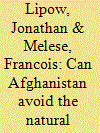

|
|
|
|
|
| Publication |
2012.
|
| Summary/Abstract |
Recent discoveries of significant mineral deposits offer Afghanistan the opportunity to attain a level of economic development sufficient to stabilize that country's volatile security situation while providing Afghans with a reasonable standard of living. Much, however, depends on whether Afghanistan can avoid the "Natural Resource Curse," an inter-related set of economic and social pathologies that often bedevil resource-endowed countries. In this article, the authors describe the Natural Resource Curse, evaluate the obstacles it raises for Afghan economic development, and offer a strategy to minimize the risks Afghanistan faces in its efforts to exploit its mineral wealth for the benefit of the population.
|
|
|
|
|
|
|
|
|
|
|
|
|
|
|
|
| 2 |
ID:
172773
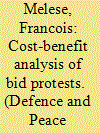

|
|
|
|
|
| Summary/Abstract |
The goal of any procurement process is to obtain ‘value for money.’ Bid protest systems are intended to help. The U.S. Department of Defense, NATO, the EU, UN, OECD, and WTO, all authorize losing bidders to protest public procurements. The threat of a protest is meant to increase government accountability, and encourage vendor participation. An extensive legal and regulatory literature discusses intended benefits of protests, but is surprisingly silent about the costs. The goal of this study is to examine both costs and benefits. Military acquisition offers an illustration. The dual objective is to minimize corruption, and maximize competition. Sadly, protest systems can inadvertently discourage both. Moreover, past protests by defense companies have generated significant costs, and triggered dangerous delays of critical defense equipment, materiel, services, and supplies required for national security. The static, probabilistic, micro-economic, partial equilibrium, representative bidder model presented in this paper offers a cautionary tale for defense organizations, government agencies, countries, and international institutions that authorize bid protests. The model reveals multiple potential deficiencies of protest systems, and recommends analysis of portfolios of alternatives to eliminate fraud and favoritism, and increase competition, to improve procurement outcomes.
|
|
|
|
|
|
|
|
|
|
|
|
|
|
|
|
| 3 |
ID:
082217
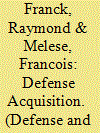

|
|
|
| 4 |
ID:
058008
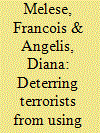

|
|
|
| 5 |
ID:
058011


|
|
|
| 6 |
ID:
072684


|
|
|
| 7 |
ID:
184057
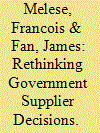

|
|
|
|
|
| Summary/Abstract |
This paper offers an economic model to assist public procurement officials to rank competing vendors when benefits cannot be monetized. An important defense application is ‘source selection’ – choosing the most cost-effective vendor to supply military equipment, facilities, services or supplies. The problem of ranking public investment alternatives when benefits cannot be monetized has spawned an extensive literature that underpins widely applied decision tools. The bulk of the literature, and most government-mandated decision tools, focus on the demand side of a public procurement. The ‘Economic Evaluation of Alternatives’ (EEoA) extends the analysis to the supply side. A unique feature of EEoA is to model vendor decisions in response to government funding projections. Given a parsimonious set of continuously differentiable evaluation criteria, EEoA provides a new tool to rank vendors. In other cases, it offers a valuable consistency check to guide government supplier decisions.
|
|
|
|
|
|
|
|
|
|
|
|
|
|
|
|
|
|
|
|
|